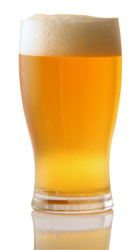PH In a Batch Sparge
#1
 *_Guest_Matt C_*
*_Guest_Matt C_*
Posted 23 May 2010 - 07:28 AM
#2

Posted 23 May 2010 - 07:43 AM
I believe the answer to this is yes but the pH and the temperature (too high) have to be off. I've been using the palmer spreadsheet as well and I don't seem to have any problems with tannins that I can detect.My question is, is it possible to extract tannins with a batch sparge?
#3

Posted 23 May 2010 - 07:55 AM
+1If you over sparged batch sparging you'd have a HUGE boil volume. I think you'd notice. As Zym said I'd suspect pH and the strike and sparge temps before I looked at over sparging.I believe the answer to this is yes but the pH and the temperature (too high) have to be off. I've been using the palmer spreadsheet as well and I don't seem to have any problems with tannins that I can detect.
#4

Posted 23 May 2010 - 08:19 AM
#5

Posted 23 May 2010 - 08:24 AM
#6
 *_Guest_Matt C_*
*_Guest_Matt C_*
Posted 23 May 2010 - 09:05 AM
#7

Posted 23 May 2010 - 09:31 AM
ThisThe pH of your mash is just as important with batch sparging as it is with fly sparging.When you are mashing (converting starches to sugar) the mash does not know which sparging technique you are going to use an hour in the furture.If you get the mash pH right, the batch sparge pH will follow. With a typical batch sparge, you never dillute the water around the grains to the point that pH, tannins, husks are a concern.zymot
#8

Posted 23 May 2010 - 09:58 AM
True, but pH can rise when you're fly sparging. I don't bother monitoring it anymore because it's been consistently well below 6.0 whether I'm brewing a Kolsch or a Stout. Guess I'm being picky..............When you are mashing (converting starches to sugar) the mash does not know which sparging technique you are going to use an hour in the furture.........zymot
#9

Posted 23 May 2010 - 11:37 AM
#10

Posted 23 May 2010 - 01:03 PM
I would not sweat it on this one. I have fly sparged for 3 years now and never checked the pH and never had any issues either. Just keep rocking as you are and don't let the potential complexity of all grain get to you. You can be as in depth and as simple as you like and still make good beer. I prefer the simpler route and its gone great. Just my $0.02Great one more thing to check and think about.
Cheers,Rich
#11

Posted 23 May 2010 - 01:26 PM
I batch sparge. I'm having enough trouble tweaking my system still. Its good to know that its not as much of a problem. I just don't want to complicate things too much yet.BTW: what will astringency taste like?Cheers,RichI would not sweat it on this one. I have fly sparged for 3 years now and never checked the pH and never had any issues either. Just keep rocking as you are and don't let the potential complexity of all grain get to you. You can be as in depth and as simple as you like and still make good beer. I prefer the simpler route and its gone great. Just my $0.02
#12

Posted 23 May 2010 - 02:11 PM
Suck on a fresh tea bag. The puckering you get that is different from bitterness. Back of the tongue is where you get the sensation. Keep your grainbed under 170df and it is very unlikely to happen. I fly with 170df water all the time and it doesn't happen here. Relax about it, unless you have a bad day and really screw things up, or decide 3# of black patent is a good idea in a 5 gal batch it probably won't happen.Once you get used to your setup and can run through a batch easily then it might be time to start tweaking these things.I batch sparge. I'm having enough trouble tweaking my system still. Its good to know that its not as much of a problem. I just don't want to complicate things too much yet.BTW: what will astringency taste like?Cheers,Rich
#13

Posted 23 May 2010 - 03:37 PM
I have to disagree. Although "most water is good for most beer", it is not all things for all beers. I strongly recommend learning about your water and mash pH.Call your water board and ask for the levels of calcium, magnesium, sodium, carbonates/alkalinity, sulfates, chlorides and chlorine/chloramine. And read John Palmer's How To Brew. He has the best explanation of mash pH I have seen.My Denver water has low residual alkalinity so it is great for pale-colored beers, but sucks for Porters and Stouts. That's why they brew pale beer in Pilzn and stouts in Dublin. John Palmer did a nice demonstrtion of this at the 2007 NHC.I would not sweat it on this one. I have fly sparged for 3 years now and never checked the pH and never had any issues either. Just keep rocking as you are and don't let the potential complexity of all grain get to you. You can be as in depth and as simple as you like and still make good beer. I prefer the simpler route and its gone great. Just my $0.02
#14
 *_Guest_Matt C_*
*_Guest_Matt C_*
Posted 23 May 2010 - 04:00 PM
Definitely true but I can see the confusion between astringency and hop bitterness. Also, the sparge temp has to be below 170 but it also must have a lower PH than 6.0. This is why I was concerned about batch sparging, I was fearing the immediate rise in PH with batch as compared to a rising PH as in fly sparging.Suck on a fresh tea bag. The puckering you get that is different from bitterness. Back of the tongue is where you get the sensation. Keep your grainbed under 170df and it is very unlikely to happen. I fly with 170df water all the time and it doesn't happen here. Relax about it, unless you have a bad day and really screw things up, or decide 3# of black patent is a good idea in a 5 gal batch it probably won't happen.Once you get used to your setup and can run through a batch easily then it might be time to start tweaking these things.
#15

Posted 23 May 2010 - 04:06 PM
The way it works is diminishing buffering capacity of the mash when you fly - thus the pH may rise, or it might not depending on water and grainbill. If you do two runnings batch sparging your pH of the second runnings will be steady from whatever it is when you start draining. It's harder to get astringency batch sparging unless you get wild and do 3,4,5 runnings.Definitely true but I can see the confusion between astringency and hop bitterness. Also, the sparge temp has to be below 170 but it also must have a lower PH than 6.0. This is why I was concerned about batch sparging, I was fearing the immediate rise in PH with batch as compared to a rising PH as in fly sparging.
#16

Posted 23 May 2010 - 04:13 PM
Technically bitterness is a flavor, you taste it with your taste receptors. Astringency is a mouthfeel. It's more of a sensation caused by the precipitation of polyphenols on your tongue. The two can typically be distinguished quite easily.Definitely true but I can see the confusion between astringency and hop bitterness. Also, the sparge temp has to be below 170 but it also must have a lower PH than 6.0. This is why I was concerned about batch sparging, I was fearing the immediate rise in PH with batch as compared to a rising PH as in fly sparging.
#17

Posted 23 May 2010 - 04:43 PM
go suck a tea bagTechnically bitterness is a flavor, you taste it with your taste receptors. Astringency is a mouthfeel. It's more of a sensation caused by the precipitation of polyphenols on your tongue. The two can typically be distinguished quite easily.
#18
 *_Guest_Matt C_*
*_Guest_Matt C_*
Posted 23 May 2010 - 06:39 PM
Good one DJ.Technically bitterness is a flavor, you taste it with your taste receptors. Astringency is a mouthfeel. It's more of a sensation caused by the precipitation of polyphenols on your tongue. The two can typically be distinguished quite easily.
#19

Posted 24 May 2010 - 10:00 AM
Possible, yes, but you really have to work at it! I'd say that if you do more than 2 sparge additions, you should strat to check your pH to make sure it's OK. But, AFAIAC, if you;re doing more than 2 sparge additions, you need to get a larger cooler or just switch to fly sparging.My question is, is it possible to extract tannins with a batch sparge? Can you possible over sparge with batch sparging?
#20

Posted 24 May 2010 - 10:22 AM
Edited by rcemech, 24 May 2010 - 10:27 AM.
0 user(s) are reading this topic
0 members, 0 guests, 0 anonymous users














